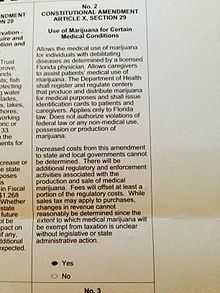Florida Amendment 2 (2014)

Florida Amendment 2, Use of Marijuana for Certain Medical Conditions, is an initiative that appeared on the November 4, 2014, ballot in the state of Florida as a citizen initiated state constitutional amendment.
It was officially certified by the state's secretary of state to appear on the 2014 November ballot and numbered Amendment 2, not to be confused with the 2008 ban on same-sex marriage of the same name. If it had been enacted, the measure would have allowed for the cultivation, purchase, possession and use of medical cannabis to treat certain medical conditions when recommended by a licensed physician. The amendment was introduced by People United for Medical Marijuana on March 26, 2009.[1][2] Supporters are widespread and include some notable public figures, the Florida Cannabis Action Network and John Morgan, head of the Morgan and Morgan law firm.[3] Highly respected members of society have acknowledged the viable need for this legislation even admitting publicly to assisting loved ones to obtain medical marijuana including last sessions Florida State Senate President, Jon Gaetz.[4] To date Twenty-three states and the District of Columbia have already passed legislation allowing doctors to recommend the medicinal use of marijuana thereby legalizing a patients possession and use.[5] Opponents include Sheldon Adelson, a Nevada Billionaire who donated $2.5 million to the Drug Free Florida Committee, which is a political committee that tried to defeat the measure.[6]
For the earlier Amendment 2 that banned same-sex marriage in Florida, see Florida Amendment 2 (2008).
2014 gubernatorial politics
The ballot measure is expected to have a significant impact on the 2014 governor's race, as the state's governor will be elected the same day the measure is voted on and both leading candidates have directly opposing views on the issue. Gubernatorial candidate, former governor, and former Morgan and Morgan employee Charlie Crist(D) supports it, while the incumbent governor Rick Scott(R) is opposed to it, with attorney general Pam Bondi leading an effort to keep it off the ballot, ultimately failing when the state's Supreme Court ruled in favor of the proposed ballot measure. Under Florida's Constitution and judiciary Florida's Supreme Court has ultimate authority and jurisdiction over state constitutional interpretation. Here, Pam Biondi backed by Rick Scott filed suit to prevent Florida residents from exercising the constitutionally guaranteed right to vote on the proposed constitutional amendment. This is the third citizen backed initiative to amend the Florida Constitution to allow for the medical use of cannabis however, several "hail-mary passes" which consisted of filing legal challenges with seconds remaining on the clock have successfully kept this matter off the voters ballot for years, effectively denying Floridian's their right to put the question to the democratic voting process. In opposition to the vote, court documents alleged each year that the proposed amendment failed to meet the rules of statutory construction regarding vagueness and violated the single subject matter rule. (State of Florida v. Citizens) Prior years experience educated the seriously ill citizens of Florida as in the oft cited lament "justice delayed is justice denied". Not to be deterred a citizens for compassion petition for a proposed amendment to the Florida Constitution on the matter of decriminalizing the medicinal use of cannabis was yet again drafted, the proposed amendment was put into a simplified statement using elementary language and petitioners began gathering the requisite minimum number of voter signatures well in advance of the deadline in order to preemptively place the proposed ballot language before the Court anticipating the inevitable legal challenge.[7] This time the Court ruled well before the ballot deadline, they determined the language of the proposed amendment was neither vague nor confusing finding that voters will know what they are voting upon and the proposed amendment specifically addressed only one subject matter as required under the Florida Constitution and will finally be placed before the voters.[8] The Court used not so subtle cues by citing the rules of review from an advisory opinion titled "Advisory Op. to Att’y Gen. re Right to Treatment & Rehab. for Non-Violent Drug Offenses", finding, "This Court has traditionally applied a deferential standard of review to the validity of a citizen initiative petition and “has been reluctant to interfere” with “the right of self-determination for all Florida’s citizens” to formulate “their own organic law.” [9] The Court leads the current administration and legislators to the river reflecting Florida's voters and current societal trends are for the reform the justice system and decriminalization of the use of marijuana. Admonishing them as representatives of constituents "There is no lawful reason why the electors of this State should not have the right to determine the manner in which the Constitution may be amended. This is the most sanctified area in which a court can exercise power. Sovereignty resides in the people and the electors have a right to approve or reject a proposed amendment to the organic law of this State, limited only by those instances where there is an entire failure to comply with a plain and essential requirement of [the law]., Id. (quoting Pope v. Gray, 104 So. 2d 841, 842 (Fla. 1958))." [8]
Charlie Crist's former law firm, Morgan and Morgan, heavily pushed for the ballot measure and became involved in the petition efforts to get it on the ballot. The candidate and former governor himself donated a large sum of his own money to the effort.
Arguments in favor
Kim Russell, founder of People United for Medical Marijuana, said that she began legalization efforts shortly after her father was diagnosed with Parkinson's disease. Some research claims that the drug can help alleviate the symptoms.[10] In response to claims that politics is the motivating factor, Russell says, "It's freedom and it's also compassion."[11]
Path to the ballot

In order to qualify for the 2014 ballot supporters are required to collect a minimum of 683,149 valid signatures by the petition drive deadline on February 1, 2014.
Supporters reported in August 2013 that they had collected at least 110,000 signatures, enough to trigger a ruling by the Supreme Court of Florida on the measure's constitutionality. Because of the cost of circulating petitions, supporters said they were pausing all petitioning activity until the measure gains the court's approval.[7]
The language in the measure was later approved for the ballot by the Florida Supreme Court on January 27, 2014. Florida Attorney General Pam Bondi had been litigating against the measure in court. An opinion against it was also filed by the Florida Legislature.
A new multi-institutional study, by the nations top medical schools[12] published in JAMA Internal Medicine, supported by the National Institutes of Health (R01DA032110, R25DA023021) and the Center for AIDS Research at the Albert Einstein College of Medicine and Montefiore Medical Center (NIH AI-51519). found that on average, states allowing the medical use of marijuana have lower rates of overdose caused deaths from opioid analgesics, such as OxyContin, Percocet and Vicodin than states without compassionate use medical marijuana laws. Researchers at the Perelman School of Medicine at the University of Pennsylvania, reviewed rates of death caused by opioid overdoses between 1999 and 2010. Results of the research reflect that on average, the (then 13) states with laws permitting medical use of cannabis reported an opioid overdose mortality rate at 24.8 percent lower after the compassionate use laws were enacted than those states without compassionate use laws. Implications of the findings may be the best evidence of the claims long made by proponents of medical marijuana use whose previous arguments were largely supported by anecdotal evidence due to the FDA ban inhibiting research. Long term benefits may be even greater where the study revealed that over time the relationship was even more apparent, as deaths attributed to opioid overdose were nearly 20 percent lower in the first year after a state’s medical use law was implemented, and opioid overdose deaths continued to decrease to 33.7 percent lower five years after implementation of medicinal use laws. The study provides irrefutable evidence using a discrete data set (state), with a clear variable (with or without medicinal cannabis use), and a measurable mortality rate may provide the proof that cannabis is a safer medication for those patients suffering from chronic pain such as that endured by cancer patients.
A poll conducted by Quinnipiac University and released on July 28, 2014, indicates that 88 percent of Florida's voters favor legalization of medical marijuana, suggesting that the initiative may pass.[13][14]
Result
Florida Amendment 2 received 58% of the vote, short of the 60% required to pass in Florida.
See also
References
- ↑ Florida Department of State Division of Elections, "Initiatives / Amendments / Revisions," Retrieved January 5, 2012
- ↑ Kush "Florida Marijuana Initiative Needs Over 670,000 Signatures for 2014 Ballot," May 3, 2012
- ↑ News-Press.com, "Florida medical marijuana advocates claim impending victory," June 3, 2013
- ↑ http://www.huffingtonpost.com/gary-stein/floridas-medical-marijuan_1_b_5772358.html?utm_hp_ref=medical-marijuana
- ↑ http://news.yahoo.com/oregon-alaska-d-c-next-vote-legal-marijuana-100031405--politics.html;_ylt=AwrBEiG4_0pUQh4AgavQtDMD
- ↑ "Nevada billionaire spending millions against Fla. marijuana amendment". Retrieved 12 June 2014.
- ↑ 7.0 7.1 Bradenton Herald, "Medical marijuana group gets 110,000 signatures, waits for high court ruling," August 16, 2013
- ↑ 8.0 8.1 http://www.floridasupremecourt.org/decisions/2014/sc13-2006.pdf
- ↑ Advisory Op. to Att’y Gen. re Right to Treatment & Rehab. for Non-Violent Drug Offenses, 818 So. 2d 491, 494 (Fla. 2002).
- ↑ "Cannabis (medical marijuana) treatment for motor and non-motor symptoms of Parkinson disease: an open-label observational study.". http://www.ncbi.nlm.nih.gov/pubmed/24614667''. National Center for Biotechnology Information, U.S. National Library of Medicine 8600 Rockville Pike, Bethesda MD, 20894 USA. Retrieved October 7, 2014.
- ↑ Herald-Tribune, "New push in Florida for medical marijuana," July 8, 2013
- ↑ Penn Medicine is one of the world's leading academic medical centers, dedicated to the related missions of medical education, biomedical research, and excellence in patient care. Penn Medicine consists of the Raymond and Ruth Perelman School of Medicine at the University of Pennsylvania (founded in 1765 as the nation's first medical school) and the University of Pennsylvania Health System, which together form a $4.3 billion enterprise. The Perelman School of Medicine has been ranked among the top five medical schools in the United States for the past 17 years, according to U.S. News & World Report's survey of research-oriented medical schools. The School is consistently among the nation's top recipients of funding from the National Institutes of Health, with $392 million awarded in the 2013 fiscal year. The University of Pennsylvania Health System's patient care facilities include: The Hospital of the University of Pennsylvania -- recognized as one of the nation's top "Honor Roll" hospitals by U.S. News & World Report; Penn Presbyterian Medical Center; Chester County Hospital; Penn Wissahickon Hospice; and Pennsylvania Hospital -- the nation's first hospital, founded in 1751. Additional affiliated inpatient care facilities and services throughout the Philadelphia region include Chestnut Hill Hospital and Good Shepherd Penn Partners, a partnership between Good Shepherd Rehabilitation Network and Penn Medicine. Penn Medicine is committed to improving lives and health through a variety of community-based programs and activities. In fiscal year 2013, Penn Medicine provided $814 million to benefit our community.
- ↑ Topaz, Jonathan. "Florida poll: Most back legal marijuana". www.politico.com. Politico. Retrieved 29 July 2014.
- ↑ http://www.quinnipiac.edu/news-and-events/quinnipiac-university-poll/florida/release-detail?ReleaseID=2064